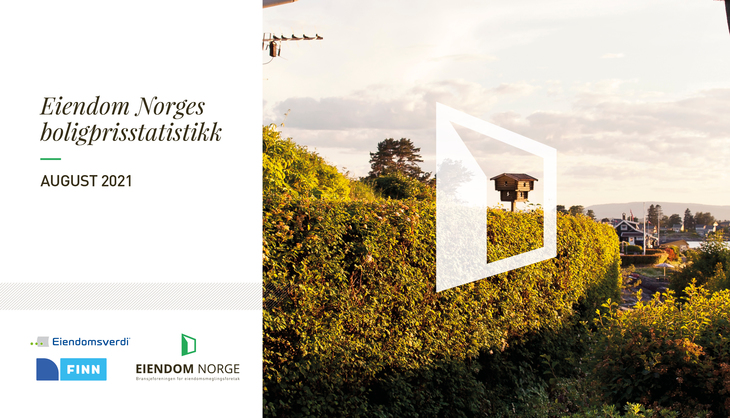
Strong rise in housing prices in August
Housing prices rose by 1.9 per cent in August. Adjusted for seasonal variations, prices rose by 1 per cent.
House prices are now 9.4 per cent higher than a year ago.
- House prices in Norway developed stronger in August than normal for the month. Inflation was markedly weaker in Oslo and neighboring municipalities than in the rest of the country. In cities such as Drammen, Sarpsborg, Fredrikstad, Hamar, Tønsberg, Skien and Porsgrunn, there was very strong growth in house prices of well over 3 percent in August, says Lauridsen.
- Despite the rise in August, the strong growth in house prices in the wake of the corona pandemic and the zero interest rate decision in May 2020 is declining. We expect price developments to continue to decline over the autumn as Norges Bank probably raises its key interest rate in September, he says.
- At the same time, the trend we have seen since March continues with weaker price development in Oslo compared with surrounding cities, even though house prices in kroner and øre in central Eastern Norway are very high. If working life is now permanently changed with a more flexible workplace for many, then it will probably have an impact on housing demand in the long term, says Lauridsen.
Record sales so far in 2021
In August, 9,465 homes were sold in Norway, which is 5 per cent less than in the corresponding month in 2020.
So far this year, 70,553 homes have been sold in Norway, which is 6.6 per cent more than in the same period in 2020.
In August, 11,711 homes were put up for sale in Norway, which is 0.4 per cent less than in the same month in 2020.
So far this year, 74,488 homes have been put up for sale in Norway, which is 5.3 per cent more than in the same period in 2020.
- Slightly fewer homes were sold in August this year than last year. So far this year, never before have so many second-hand homes been put up or sold, says Lauridsen.
It took an average of 35 days to sell a home in August 2021, down from 45 days in July. Bodø w / Fauske had the shortest sales time with 16 days and Stavanger w / surroundings had the longest sales time with 47 days.
- On average, so far in 2021 it has been a little faster to sell a home in Norway than in recent years. The fast sales time testifies to an efficient and well-functioning housing market, says Lauridsen.
Bodø strongest last year
The strongest seasonally adjusted price development in August was Drammen w / surroundings, Hamar w / Stange and Tønsberg w / Færder with an increase of 1.5 per cent. Follo had the weakest seasonally adjusted price development with unchanged seasonally adjusted development.
Bodø / m Fauske had the strongest development in the last 12 months, with an increase of 15.9 per cent. Ålesund m / omegn had the weakest development in the last 12 months with an increase of 6 percent.
- 12-month growth rose nationally and in areas with strong development in August. We expect house prices to fall as normal through the autumn, says Lauridsen.
New government with housing minister
September 13 is the parliamentary election and as it looks in the polls now we will have a new government.
- SV leader Audun Lysbakken has stated they want a separate housing minister in a new government. It is a good idea, and we expect that a separate Minister of Housing will continue much of the good simplification and coordination work in the housing area that Jan Tore Sanner (H) and Nikolai Astrup (H) have done, says Lauridsen.
If a Minister of Housing in a new government is to have more weight than today, the post must have more responsibility than the current Minister of Local Government and Modernization. A low-hanging fruit is to transfer responsibility for the Housing Construction Act, the Real Estate Registration Act, the Land Tenure Act, the Condominium Act and the Disposal Act from the Minister of Justice to the Minister of Housing, he says.
- In addition, a new Minister of Housing must have a close dialogue with the Minister of Finance about taxes and fees on housing, as well as credit regulations. Coordination of housing laws, taxes, fees and credit is absolutely crucial for the Norwegian housing market to function even better than today, Lauridsen concludes.



